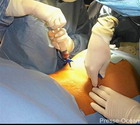Stem Cell Transplant
Adult stem cells are showing a potential for regeneration opening up new research and therapeutic horizons, especially with their important advantages: a better immune tolerance in some cases, a lower risk of cancer in autologous stem cell transplant, and greater chromosomal stability. Moreover, given that their collection is part of blood donations from "informed and consenting adults", the ethical problems do not arise in contrast to the use of embryonic stem cells. Similarly, the use of stem cells from placental cord blood is not a subject of debate since it is a "res nullius".
Furthermore, in clinical trials, cells were isolated and were shown able to regenerate tissues of the body: i.e., mesenchymal cells can produce bone and cartilage, the myocardial cells can regenerate cardiac tissue, neural cells can regenerate the nervous system, The pancreatic cells are involved in the regeneration of pancreatic islets, the islets of Langerhans, and so on. Thus we can see the full benefits, development of regenerative medicine is likely to bring in Parkinson's disease, in different forms of diabetes, in myopathies and to the myocardial tissue after infarction.
Cord Blood Stem Cell and Bone Marrow Transplants
Most diseases benefiting from the therapeutic input of stem cells are treated using bone marrow transplantation or cord blood stem cell transplant (i.e., placental blood). Transplants of Hematopoietic stem cells derived from umbilical cord blood are growing, because of the quite interesting properties characterizing this type of cells, i.e., their immunological immaturity and the advantage of providing a readily available source of cells.
This has the effect of reducing the waiting time for transplantation. It also explains, why actually cord blood donations tend to replace those of bone marrow, though it is not the only reason, as bone marrow transplant is also a difficult procedure to go through, donations are uncommon, and the requests of patients belonging to a rare HLA (Human Leucocyte Antigen) group are difficult to meet.
Donating cord blood, however, is painless, and with immediate and infinite availability (if it was kept in a cord blood bank), and its transplant raises fewer problems of tissue compatibility between donor and recipient.

